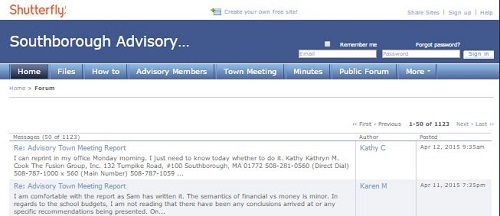Above: Acting as a resident, John Butler proposed voters force town committees to adopt an open communication model similar to one used by the committee he serves on. (Image from Advisory Committee website)
Last night, John Butler asked residents to make a move towards transparency. Butler presented his article to require town boards and committees to promptly post all communications online for public access.
It was a measure that most seemed to favor in concept. But the plans for implementation and future expense were too unclear for most voters.
Some worried about implementation and others about costs. School Committee Gerry Capra labeled it another “unfunded mandate”.
Butler claimed that it can be done with no cost to the Town, if each committee replicated the model used by the Advisory Committee and some other current/past boards. Those committees use a free commercial website (Shutterfly). Therefore, he assumed that it would be a low cost for the Town to setup it’s own site if preferred.
[Editor’s Note: I do need to point out here a discrepancy I’ve noticed. Part of his proposal is that the communications be searchable and indexed. That isn’t currently available on any committee websites. Anyone can view Advisory emails on Shutterfly. But you can not search them on the site or through a search engine. (Strange exception – only minutes from January 2009 on the “old materials” page can be pulled up by Google searches.)]
On the floor, Butler amended his request for to fund an implementation plan with a $2,500 budget. He said that it would be a first step towards the improved transparency.
Chair Bill Boland told voters that the Board of Selectmen opposed it as unnecessary and overkill.
Selectman Paul Cimino clarified that the majority of the board supported the concept. It was execution they were concerned about. He pointed out that the version before voters last night was different than what was presented to the board.
For some, the idea seemed better as a guideline than bylaw. Most Advisory Committee members supported the measure. But Chair Brian Shea expressed his minority opinion.
Shea explained that residents’ may not always understand that their communications to the boards would be publicly exposed. He pointed to a recent incident where a resident’s email indicated he would be out of the country for several weeks. The Advisory Chair said he worked to strip that from the Advisory website. But if a bylaw was passed, that would be prohibited.
Others questioned if Butler’s low cost assumption was accurate. They wanted more information.
According to Butler, the article would be self nullifying if voters didn’t support funding implementation next year.
Town Counsel Aldo Cipriano told voters that no bylaw is self-nullifying. According to Cipriano, voters would have to act on it each year as long as the bylaw stood. It was only one of the counsel’s legal objections. He also claimed that the the Secretary of States’ public records office advised him he would likely be called upon “weekly to determine what if any exemptions” pertained to public records.
Pushed to a vote, the article failed.


